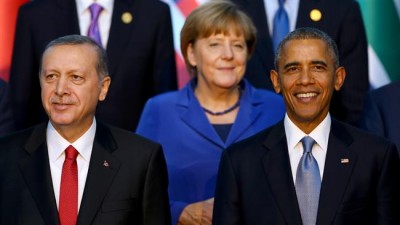Merkel’s two Extraordinary Errors of Judgement: Weapons to Israel, Germany’s Refugee Policy. What Implications for the EU

1. The German Chancellor’s unilateral decision to allow Israel to obtain a fleet of Howaldtswerke-Deutsche Werft-built, 2000 ton, Dolphin-class submarines costing $2 billion each (having been subsidised by the current German Government apparently to assuage its misplaced guilt regarding WW2), four of which warships are assumed to have already been armed with nuclear missiles at Haifa naval base and currently secretly patrolling the Gulf, the Mediterranean and possibly the North Sea thereby giving the Israeli state a ‘second strike’ nuclear capability far in advance of that of either Britain, Germany or France and posing a potential threat to all European states.
Israel being the world’s only undeclared nuclear state and, as such, is uniquely outside of any control or inspection by the UN’s IAEA as it is not a party to the nuclear Non-Proliferation Treaty to which all EU states are signatories. Israel, of course, is also not subject to any EU law notwithstanding that it is estimated to hold a stockpile of between 200 and 400 nuclear warheads in its undeclared arsenal.
2. Merkel’s ‘open-arms’ migrant policy that allows a million more migrants into Germany is seen as a disaster for the EU that will indelibly change European culture. US commentators have said that it threatens ‘not just a spike in terrorism but a rebirth of 1930’s- style political violence.’ It is said that such an immigration policy is potentially disastrous for the long-term future of Germany (and other EU states) that will ensure ‘a highly skewed demographic ratio’ of young men from Syria, the Middle East and North Africa. There follows a warning that there will likely be a deep transformation of Germany whereby in only 20-30 years, half of German society under the age of 40 will be immigrants or children of immigrants.
That is the frightening legacy of Chancellor Merkel that will conceivably have a greater long-term impact upon European society than either of the two world wars, albeit not by violence but through cultural change.

